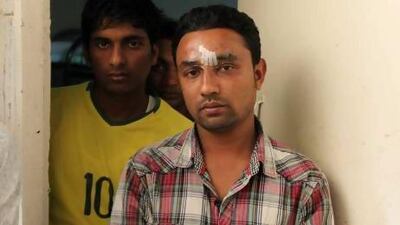AL AIN // When Mohammed Rabbani received the call yesterday morning from his father, who was anxious to hear from him after news of the fatal bus crash spread across Bangladesh, he made the decision to leave out some vital information.
Having sustained minor injuries to his left hip, knee and right arm, the 23-year-old has not yet told his family that he was on the bus carrying 48 men, half of whom died after it was hit by a lorry carrying 75 tonnes of building materials; that he was involved in the worst road traffic accident in the UAE's history.
"I don't remember anything. I just heard the crash," he told The National.
"My family does not know because my mother has high blood pressure," added Mr Rabbani from his hospital bed as he waited to be discharged.
Mr Rabbani, who was treated at NMC, a private hospital in Al Ain, was on the bus with 13 of his friends and roommates. Seven died in the crash and, of the five other survivors, the expatriate, from Joshai, has only managed to get in contact with one.
Although he has been told by his sponsor that he will not lose wages for the days he will spend in recovery, other information regarding the crash and the names of the dead passengers has been hard to come by.
"The men worked for different companies," said a colleague who was at the hospital to be with his friend. "Still, all the dead, the families have not been informed."
When Mr Rabbani returns to the room he calls a home at a nearby labour camp, it will be with a heavy heart. The room, with "number one" written on the front door, housed nine men, all of whom were on the bus. Only two survived.
The men, who shared the camp with about 140 others, were all friendly, said workers who were not on the bus but who witnessed the crash.
"One had three children, another had one and five were married," said one man at the camp.
"We tried to save them," he said.
Nearby, in Room 19, 29-year-old Mansour Khan rested after being discharged from hospital yesterday.
Holding his right arm, which had five butterfly stitches across his forehead and numerous smaller injuries across his upper body and head, the father-of-one remembers little about the crash aside from his initial reaction, which likely saved his life.
"The bus rolled two or three times and I held the bars on the side of the chair," he said.
"That saved me. I am also thankful to God."
Mr Khan, who worked for one of many companies whose staff was on the bus, has since informed his family back in Sylhet, Bangladesh.
He has also been instructed to return to the hospital in five days for a check-up.
Other men in the camp hold up pictures: some showing the faces of the men that died, others, with smiling children and wives peering out, of their families back home.
In one, Kurshid Alam, who is in his mid-twenties, poses on a chair, smartly attired and smiling. Mr Alam, who married at the beginning of the year, perished in the accident alongside his younger brother, Masoud, whose picture was also passed around a group of men at the camp.
Their father, who also works in the emirate, has been to the morgue at Al Ain Hospital to identify his children.
Without an official report naming the dead, some of their friends and colleagues are still unaccounted for, said the men.
"There were some Pakistani men here, we always met them, but now they have gone," they said.
zalhassani@thenational.ae

